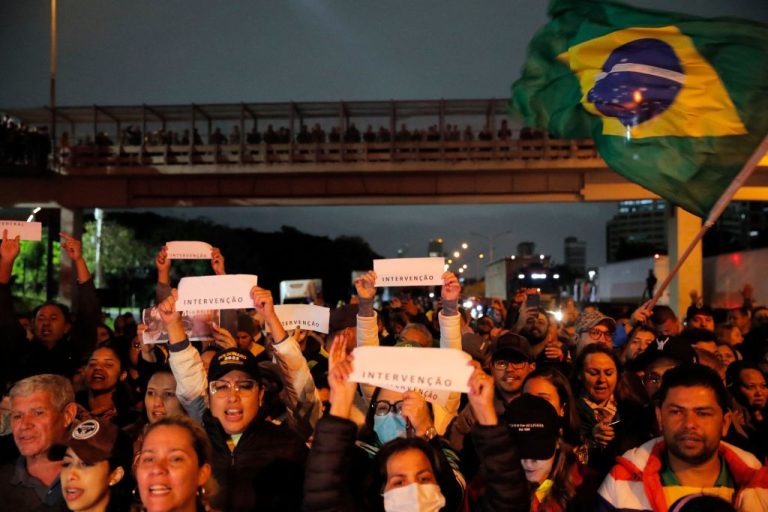Commentary
A string of massive and widespread protests is rocking Brazil after Jair Bolsonaro was declared defeated by challenger Luiz Inácio Lula da Silva in a razor-thin Oct. 30 run off election.
Reporting on Lula’s victory by CNN characterized the change of guard as “herald[ing] a political about-face for Latin America’s largest country, after four years of Jair Bolsonaro’s far-right administration.”
The broadcaster trumpeted Lula’s triumph as “represent[ing] the return of the left into power in Brazil.”
According to CNN, Bolsonaro’s reign left Brazil in such shambles that Lula has to pick up the pieces of “a country plagued by gross inequality that is still struggling to recover from the Covid-19 pandemic.”
Success
You are now signed up for our newsletter
Success
Check your email to complete sign up
The situation is dire enough that Brazil is a land that has “approximately 9.6 million people [who] fell under the poverty line between 2019 and 2021,” with children’s “literacy and school attendance rates hav[ing] fallen,” CNN declared.
While English-language news on the controversy surrounding the election is nigh impossible to find even a glint about on search engines Google and Bing — results are completely whitewashed with pages of articles from establishment media such as The Guardian’s Oct. 27 piece Fears Bolsonaro May Not Accept Defeat as Son Cries Fraud Before Brazil Election — the narrative that everything transpired on the up and up is completely homogenized.
Reporting by Reuters likewise called Bolsonaro a “right-wing nationalist” as it criticized the outgoing President for not making public comment on the defeat for 44 hours.
When Bolsonaro did speak, he neither conceded defeat nor supported the protestors, but did say his administration would not attempt to blockade the formal transition of power on a bureaucratic level.
In a similar theme to the 2020 U.S. presidential elections, Reuters decided to dismiss Bolsonaro’s paraphrased pre-election claims “that the electoral system was open to fraud” as “baseless” without any journalistic or academic rigor to support the position.
To the contrary, Reuters garnished the “leftist” Lula with praise, such as, “Lula’s victory represents a stunning comeback for the 77-year-old former metalworker, who spent 19 months in jail for corruption convictions before they were annulled last year.”
And, “Lula has vowed to overturn many of Bolsonaro’s policies, including pro-gun measures and weak protection of the Amazon rainforest. His aides confirmed on Tuesday that he would attend this month’s COP27 United Nations climate summit in Egypt.”
Nonetheless, something has agitated the 48 percent of Brazil’s eligible voters who voted for the former President enough to start massive blockade-style protests in an attempt to win support of the country’s military.
Nov. 1 reporting by The National Pulse’s Vish Burra referenced a number of videos the author received from sources in Brazil showing that a wide range of the populous, from ordinary people to farmers, to even members of the Federal SWAT Police, Military Police, and Road Police, were actively participating in the protests.
The videos were shared on Elon Musk’s Twitter, and in response, were branded with the “misleading” label providing a link to “learn why election experts say civic processes in Brazil are safe and secure” while locking down the tweets from being liked or shared.
Burra explained the protestors’ rationale, “They hope that by coordinating mass demonstration, they can enlist local police support, and leverage that to signal to the military that they need to support Bolsonaro. This, in turn, would embolden Bolsonaro himself.”
“It is important to note that there are virtually no mechanisms to audit or recount election results in Brazil (except if the challenge is brought by a supermajority of the Brazilian Senate, which Bolsonaro is poised to have in January should he successfully contest the results of this election),” he continued.
“Protestors feel military support for any action contesting the election results is, therefore, key.”
Other videos from various anonymous sources show massive Canadian Freedom Convoy-style protests complete with construction equipment and semi-trucks participating in vigorous rallies.
Others showed videos scraped from the Chinese Communist Party’s TikTok that showed massive lines of semi trucks blocking major thoroughfares as a tractor brought in piles of tires to feed a fire in the middle of the roadway.
Some videos posted appeared to show military vehicles carrying uniformed and armed soldiers peacefully rolling through the center of the protests, with some waving to protestors.
The rallies were begrudgingly and quietly covered by the English establishment media. On Nov. 1, CBS criticized Bolsonaro “who had yet to accept his election loss to leftist Luiz Inacio Lula da Silva” while acknowledging the former President had already notified the public he would comply with a transition of power in a same day speech.
“During a short speech on Tuesday, Bolsonaro said he would ‘comply’ with the constitution, but did not reference his election loss,” the outlet wrote.
The National Pulse’s Burra explained that for Bolsonaro to attempt to really contest the elections without the formal support of the military may be akin to more than just simply political suicide.
“If Lula re-assumes the Presidency, his first likely orders of business will be to bless an already runaway judiciary to come completely off the chain and start the political persecution of the pro-Bolsonaro groups: including truck drivers, farmers, construction workers, police, and military personnel. This is the first domino,” Burra wrote.
And added, “The weaponized judiciary of Brazil will persecute congressmen, senators, ministers, and inevitably Bolsonaro himself. The regime must reclaim its legislative and bureaucratic apparatus in the wake of an otherwise successful election for Bolsonaro’s party and ruling coalition.”

















